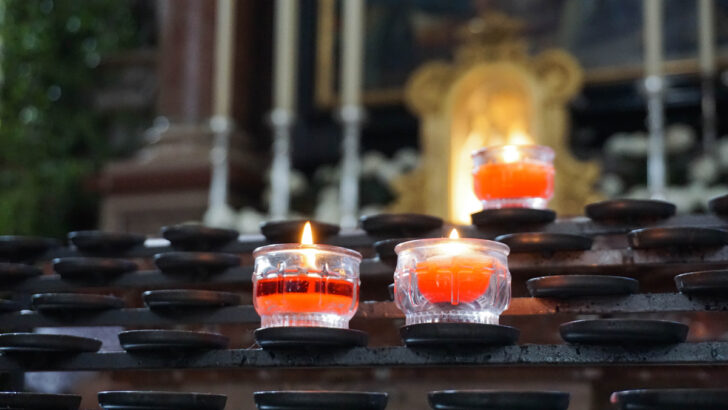Jenna Marie Cooper
Q: Why do Catholics pray for the souls in purgatory to lessen their sufferings? Is it possible that the souls already in purgatory would even go to hell, so our prayers for them would save them from going to hell?
A: We don’t pray that souls in purgatory won’t wind up in hell, because hell is no longer a possibility for them. We do pray because we hope that, through our prayers and sacrifices, the sufferings of their purgation might be eased and their journey to heaven might be hastened.
Let us recall that heaven is a state of eternal happiness arising from perfect union with God, and hell is a state of eternal suffering arising from one’s freely-chosen rejection of God. It is by God’s grace that heaven is possible for us in the first place, but to a great extent where we spend eternity depends upon us. We can choose to reject God through our sinful actions, or we can choose to accept God’s gift of eternal life by striving for a life of virtue and in repenting from our sins.
Whether we go to heaven or hell is decided at the point of our death. But we know that God is merciful and wants us to be in eternity with him. God is therefore very forgiving and will save even the most sinful soul – even if that person only repents at the last minute! Think for instance of St Dismas, the “good thief” who was crucified next to Jesus, and to whom Jesus promised paradise (Lk 23:39-43).
However, not everyone ultimately destined for heaven will be ready to meet the all-holy God face-to-face immediately upon death. Catholics believe in a state called purgatory, which is a place of purification specifically in preparation for heaven.
As the Catechism of the Catholic Church tells us: “It is necessary to understand that sin has a double consequence. Grave sin deprives us of communion with God and therefore makes us incapable of eternal life, the privation of which is called the ‘eternal punishment’ of sin. On the other hand every sin, even venial, entails an unhealthy attachment to creatures, which must be purified either here on earth, or after death in the state called Purgatory. This purification frees one from what is called the ‘temporal punishment’ of sin. These two punishments must not be conceived of as a kind of vengeance inflicted by God from without, but as following from the very nature of sin.” (ccc 1472)
In other words, all sin leaves some damaging effect on our souls which can often last even after we have repented or sought absolution in the Sacrament of Penance. Purgatory is a time of repairing this damage. We understand purgatory to be a finite period of suffering, often described or depicted artistically as a purifying fire. Still, the suffering of purgatory is of a radically different nature than the torments of hell, since the souls in purgatory have the joy of knowing that they are on their way towards God.
Incidentally, we can pray for the dead even if we may personally have doubts about an individual’s salvation. While a soul in hell can no longer benefit from prayers, we never know what happens between a soul and God in the final moments of life. Prayers for the dead are never wasted.
There are several biblical citations referencing prayers for the dead, most famously, 2 Mc 12:44-45: “For if [Judas Maccabee] were not expecting that those who had fallen would rise again, it would have been superfluous and foolish to pray for the dead. But if he was looking to the splendid reward that is laid up for those who fall asleep in godliness, it was a holy and pious thought. Therefore he made atonement for the dead, that they might be delivered from their sin.”
Jenna Marie Cooper, who holds a licentiate in canon law, is a consecrated virgin and a canonist whose column appears weekly at OSV News.



